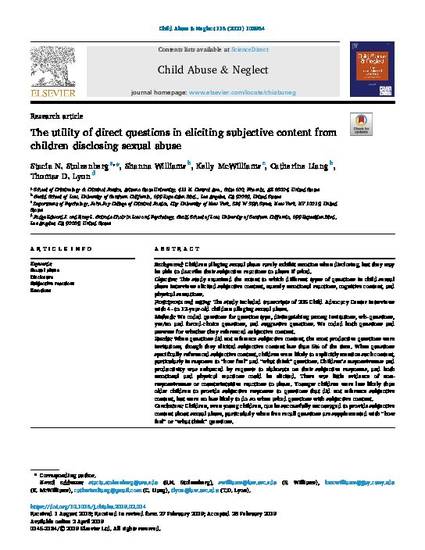
Article
67. The utility of direct questions in eliciting subjective content from children disclosing sexual abuse.
Child Abuse & Neglect (Published 2021)
(2019)
Abstract
Background: Children alleging sexual abuse rarely exhibit emotion when disclosing, but they may be able to describe their subjective reactions to abuse if asked. Objective: This study examined the extent to which different types of questions in child sexual abuse interviews elicited subjective content, namely emotional reactions, cognitive content, and physical sensations.
Participants and Setting: The study included transcripts of 205 Child Advocacy Center interviews with 4- to 12-year-old children alleging sexual abuse.
Methods: We coded questions for question type, distinguishing among invitations, wh- questions, yes/no and forced-choice questions, and suggestive questions. We coded both questions and answers for whether they referenced subjective content.
Results: When questions did not reference subjective content, the most productive questions were invitations, though they elicited subjective content less than 5% of the time. When questions specifically referenced subjective content, children were likely to explicitly mention such content, particularly in response to “how feel” and “what think” questions. Children’s responsiveness and productivity was enhanced by requests to elaborate on their subjective responses, and both emotional and physical reactions could be elicited. There was little evidence of non-responsiveness or counterintuitive reactions to abuse. Younger children were less likely than older children to provide subjective responses to questions that did not reference subjective content, but were no less likely to do so when asked questions with subjective content.
Conclusions: Children, even young children, can be successfully encouraged to provide subjective content about sexual abuse, particularly when free recall questions are supplemented with “how feel” or “what think” questions.
Keywords
- child abuse,
- child sexual abuse,
- child witness,
- disclosure,
- subjective reactions,
- subjective content,
- direct questions
Disciplines
Publication Date
February 28, 2019
Citation Information
Stolzenberg, S.N., Williams, S., McWilliams, K., Liang, C., & Lyon, T.D. (2021). The utility of direct questions in eliciting subjective content from children disclosing sexual abuse. Child Abuse & Neglect, 116, 103694.
